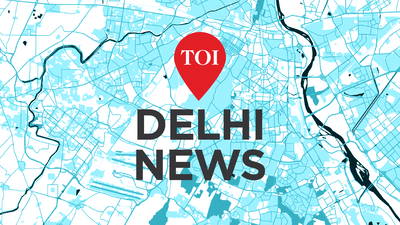- News
- City News
- delhi News
- There’s no support for us: Differently abled speak out
Trending
There’s no support for us: Differently abled speak out
New Delhi: "I live on the footpath. I don't have a wheelchair; I use crutches for my daily activities. Today, I'm using them to vote," said Mohammad Mosad (32), proudly showing his inked finger after voting at the Mehrauli polling station. For differently abled voters, election day was an opportunity to make their voices heard. From the elderly to the young, each person carried a unique story of resilience. Seventy-year-old Jameela Khatoon, battling cataract and limited mobility, was brought to the Mundka polling booth by her family.
"Since my childhood, I have seen my parents wake up early on election day to vote," she told TOI.
"I have almost lost faith in political leaders because there are too many promises and too few that are actually fulfilled," she said wistfully, but then added, "However, I still believe in the power of change." Despite facing physical and logistical challenges, several voters with disabilities displayed remarkable determination to exercise their democratic right. Issues of mobility or inadequate infrastructure failed to deter them. Many of them were unaware of the option to vote from home for persons with disabilities. Some were shocked while others expressed frustration. At Seelampur, 86-year-old Shobha Rani, who relies on a wheelchair, made her way to the polling booth with the assistance of her son. "I came here with my son because I need help getting around," she said. Unaware of the home-voting option, she said, "It's important for me to come out and vote. This is something I want to do." Umar Khan (66), who uses a wheelchair and can't walk, was at the CRPF school in Dwarka to cast his vote. His son said, "People don't realise how challenging it is for those with disabilities to even leave their homes. But my father still chose to come out to vote because he hasn't lost faith in the sanctity of our democracy."
In Janta Mazdoor Colony, 22-year-old Mohammad Anas, who is differently abled, came with his mother to vote. Sitting on a specially-designed tricycle for differently abled individuals, Anas, who is preparing for railway exams and hopes for better opportunities, said, "Job creation for people like us is very important. Govt should introduce schemes that specifically help differently abled individuals and other marginalised groups."
"Unemployment is a big issue. We don't even have proper practice grounds. We represent the country too, but there's no support for us. Even the prize money for medals is delayed. I want the new govt to address these problems," he said.
Confined to a wheelchair ever since his paralysis attack, Mewa Ram (71), a former telecom dept worker who lives in Trilokpuri, expressed satisfaction with the city's governance, especially health facilities: "Hospitals are a second home for people in my condition and age. Our priority is healthcare, and I'm happy with it." Many arrived early to avoid the crowds. At Railway Colony in Shakur Basti, Sandeep Yadav (30), who has a walking disability, turned up at the booth at 10am. "I have no issues with the work being done, but I would be happier if the infrastructure was more disabled-friendly," he said.
His frustration with the lack of accessibility was echoed by others, especially those with visual impairments. Sita Kumari (18), a first-time voter who is visually impaired, said, "There are countless obstacles when we go out. People don't notice us and push us aside. There aren't tactile paths everywhere to guide us." Urging govt to focus on making Delhi more friendly for those with visual impairment, she added, "We still have a long way to go."
Shyam Choudhary, who is also visually impaired, emphasised the need for technological assistance to help the differently abled: "Technology should play a larger role, especially with artificial intelligence linked to electronic Braille devices. Govt should provide free Braille laptops and phones to help us study and overcome other challenges."
At a polling booth in Kalkaji, Satyavati Gupta (79), a retired school teacher confined to a wheelchair due to arthritis and osteoporosis, said she rarely goes out, but feels strongly about voting. "I cherish this day because the election has brought me out with my family, and I got to converse with young people and know more and do more for them."
While the Election Commission has created more disability-friendly polling booths, including the provision of wheelchairs, tactile paths and volunteer assistance, on the ground, the process remains a challenge for many.
Check out the latest news about Delhi Elections 2025, including key constituencies such as New Delhi, Kalkaji, Jangpura, Patparganj and Rohini, Chandni Chowk, Rajinder Nagar, Greater Kailash, Okhla, Dwarka.
End of Article
FOLLOW US ON SOCIAL MEDIA
Visual Stories
Hot Picks
TOP TRENDING
Explore Every Corner
Across The Globe











